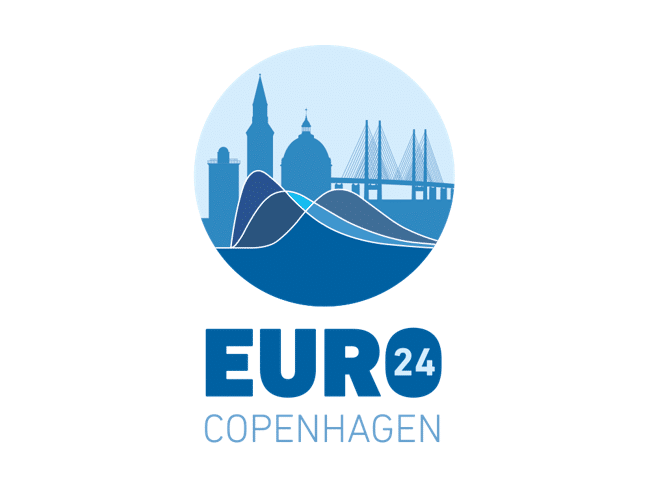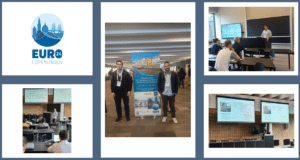
10 Jul ELTRUN at the EURO 2024 Conference
In the context of the “European Conference on Operational Research – EURO 2024”, researchers from ELTRUN The E-Business Research Center presented a number of ongoing optimization related works. EURO 2024 was held in Copenhagen between 1-3 July 2024 and is the 33rd edition of the largest European conference on operations research. In the conference, academics and practitioners from all over the world shared their latest findings and ELTRUN participated with the work of the [ADOPT] Advanced Manufacturing & Optimisation Group. The presentations given and a short description can be found in the following paragraphs.
Georgios Zois presented the work entitled “Integrated optimization for aluminium rolling. This work focuses on the aluminium production scheduling problem of a leading European Copper and Aluminium industry. The problem forms an interesting variant of flexible flow-shop scheduling consisting of two successive stages, the preheating and the hot rolling of aluminium slabs i.e.,: A set of slabs arrives over time and (in the preheating stage) is assigned to a set of parallel furnaces. Once preheating is completed, each slab is unloaded and immediately transferred to a hot rolling mill.
Each furnace operates in a FIFO manner under slabs’ eligibilities and capacity constraints, while the hot rolling mill can handle a single slab every time instant, under predefined quality conditions regarding the minimum and maximum number of slabs per production cycle. Each slab is accompanied with preheating and rolling times and is subject to quality restrictions determined by the sequence of slabs in the same production cycle. Slabs also require specific preheating operations and can only be preheated with slabs of compatible operations in the same furnace. We propose an integrated optimisation framework, comprised by an exact method for each production cycle, which combines a MILP and CP formulation for both stages, and a sequential heuristic approach for planning over multiple cycles. We provide experimentation on real instances, showing the versatility of our approach in terms of supporting different planning approaches thus maximising quality of production and machines usage
Stavros Vatikiotis presented the ongoing work performed on the Hybrid Flexible Flowshop (HFFS) Scheduling Problem which is dealt with within the EU-funded research project MODAPTO. After the problem description, which goes beyond state-of-the-art related literature, the already designed methods and algorithms were analyzed. Results derived by the initial experimental procedure were, also, presented and the next steps to be followed were listed.
Ioannis Avgerinos’ presentation focused on integrating regular local search operators to explore k-OPT neighborhoods of solutions into exact decomposition methods. After enumerating these neighborhoods and obtaining their local optima, a local branching cut eliminates all their solutions at once, thereby reducing the number of iterations required for convergence. Experiments on two challenging scheduling problems—minimizing total completion times and minimizing total tardiness on unrelated machines with sequence-dependent and resource-constrained setups—show a considerable reduction in optimality gaps or acceleration of convergence compared to regular Logic-Based Benders Decomposition schemes.



Sorry, the comment form is closed at this time.